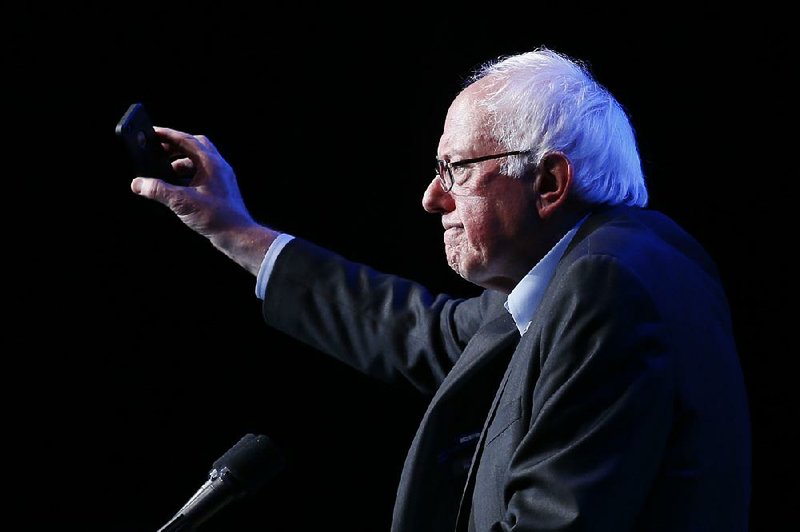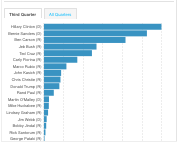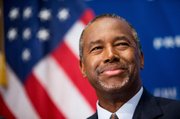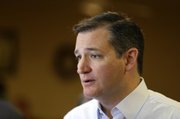NEW YORK -- After the U.S. Supreme Court's ruling in Citizens United, this was supposed to be the era of big money in politics. It's proving to be the era of small money, too.
RELATED ARTICLE
http://www.arkansas…">Friend says Biden near campaign decision
Establishment candidates for the presidency like Jeb Bush, Marco Rubio and Hillary Rodham Clinton, who rely on the traditional dinner-party fundraising circuit to collect stacks of $2,700 checks, are being upstaged in the money race. Ben Carson, Bernie Sanders and Ted Cruz are turning their popularity with their parties' grass roots into cash, piled up in smaller increments, often over the Internet.
Carson, a retired brain surgeon who has never held public office, led the Republican field in campaign fundraising for the quarter that ended in September. His $21 million take included $12 million in contributions of less than $200. Sanders' $26 million haul, gathered mostly from under-$200 donors, almost equaled Clinton's total.
"There are just more small donors in the action, because they think this time they're in control," said Kellyanne Conway, a Republican pollster in New York who runs a super political action committee supporting Cruz. "It's a contest between electability and electricity, and electricity is winning."
Technology is transforming the election, allowing candidates to turn an attention-grabbing debate performance or a viral sound bite into millions of dollars in a matter of hours with the help of social media and smartphones. Carson said he raised $1 million within 24 hours of his appearance at a Republican debate in September, and that donations poured in at a similar rate later in the month when he declared that a Muslim shouldn't be president. Sanders' campaign said he raised $1.3 million in four hours after his debate appearance.
To be sure, the avalanche of super PAC money unleashed by Citizens United and subsequent court decisions in 2010 remains a critical factor in the race. Bush, who has gathered $25 million for his campaign since declaring his candidacy in June, spent much of the first half of the year assembling a $102 million super PAC. These vehicles can raise unlimited sums from individuals and corporations -- some individual Bush donors wrote checks of $1 million or more -- as long as they don't coordinate certain types of spending with a campaign.
The limitations of unlimited money were brought into focus in September when the campaigns of Republicans Rick Perry and Scott Walker collapsed. Both had the backing of super PACs with millions of dollars still in the bank, but a drought of traditional campaign cash left them unable to fund the basic necessities of running for office, such as airline tickets and payroll.
Under campaign-finance law, an individual can contribute no more than $2,700 per election directly to a campaign. In the past, candidates often used networks of "bundlers" to overcome this limitation. Bundlers are well-connected supporters who can raise hundreds of thousands of dollars by persuading friends and business associates to contribute the maximum amount. Of the bundlers from 2012 who have signed on to a campaign so far, most have gravitated to Clinton, Bush and Rubio.
Reports filed with the Federal Election Commission show that Sanders kept pace with Clinton's fundraising, collecting more than $26 million from July 1 to Sept. 30, a time when Clinton raised $29 million.
The documents reveal stark differences in how the two Democrats did it.
Three-quarters of Sanders' contributions were for $200 or less, though he did net about 300 checks of $2,700 from donors including actor Danny DeVito, Silicon Valley venture capitalist Andrew Rappaport and New York entrepreneur Henry Jarecki.
People giving less than $200 made up 17 percent of Clinton's summer fundraising.
Instead, she leaned heavily on traditional financing events such as dinners where people must pay $2,700 to attend. Her campaign on Thursday also released a lengthy list of its "Hillblazers," or fundraisers who have bundled at least $100,000 in donations from others for the campaign since its start in April.
Among those top fundraisers: Virginia Sen. Tim Kaine, and Reps. Grace Meng of New York, Jim Himes of Connecticut and Joaquin Castro of Texas.
Clinton also has expanded her investment in the so-called Super Tuesday elections in an effort to build a March 1 firewall, should Sanders pick up wins in early-to-vote Iowa and New Hampshire. Data analyzed by President Barack Obama's campaign showed a direct correlation between supporter enthusiasm in the last six weeks before the election and how early local organizing efforts began in their areas. Some of Obama's campaign staff now work for Clinton.
Howard Dean pioneered online political fundraising in his unsuccessful 2004 campaign for the Democratic nomination, raising about $20 million online, according to Larry Biddle, who served as Dean's finance director. Obama raised even more in 2008 when he defeated the onetime front-runner Clinton for the Democratic nomination. But this year marks the first time that small donations were able to propel outsider candidates to near the top of the fundraising heap early in a campaign.
Online fundraising will continue to expand dramatically, driven by the growth in the pool of people who are comfortable making payments online, said Joe Trippi, who managed the Dean campaign. Given how big it is already, he said he's surprised Sanders didn't raise even more this summer. "He's now just scraping the surface of the huge network that has been established," Trippi said.
Why haven't establishment candidates like Clinton and Bush been able to capitalize more on the technology? Partly, said Bill Smith, a political consultant at Civitas Public Affairs in Washington, it's because such candidates are loath to make the kind of inflammatory statements that would ignite donors' passion and risk alienating independents in a general election. "Ben, Ted, Bernie -- they're saying some pretty out-there things," he said. "They're able to use that to big effect to fire people up."
Clinton has outpaced Bush when it comes to attracting small donations. She raised $5.2 million from under-$200 donors in the third quarter, or 18 percent of her total. Bush's fundraising included only $877,000 of these small donations, or 7 percent of what he raised.
Overall, candidates running for president this year have raised about $96 million, or about 36 percent, of their funds in under-$200 increments, split evenly between the two major parties. That compares with $57 million, or 39 percent, for the entire field as of September 2011, when incumbent Obama dominated small-donor fundraising. The figure was $67 million, or 18 percent, in September 2007.
The campaigns of both Clinton and Sanders ended last month with plenty of available cash. Clinton had $32 million and Sanders $27 million -- totals higher than any of the candidates on the Republican side.
And there are signs that Sanders can continue to count on a cash influx.
In the hours after Tuesday's Democratic debate, he raised upward of $2.5 million. That's more than Kentucky Sen. Rand Paul raised all summer for his Republican presidential bid.
Information for this article was contributed by Zachary Mider of Bloomberg News and by Julie Bykowicz, Ken Thomas, Lisa Lerer and Jack Gillum of The Associated Press.
A Section on 10/18/2015





